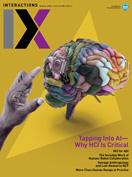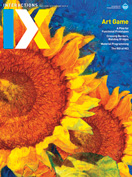Authors:
Loren Terveen
On January 27, 2017, President Donald Trump signed an executive order that imposed a 90-day suspension of visas for citizens of seven countries—Iran, Iraq, Syria, Libya, Somalia, Sudan, and Yemen—meaning that people from these countries would be unable to enter the U.S. It also meant that if citizens of these countries were in the U.S. and left, they would not be allowed to return.
As I write this, judges in the U.S. have blocked the implementation of the order, and by the time you read this, the situation likely will be very different—but how, I cannot anticipate.
Why discuss this here? For one reason, ACM SIGCHI is an international society [1] that lives on the free exchange of information, which in turn requires freedom of expression and freedom of movement. For example, we see this in our conference locations: from 2008 to 2019, the CHI conference will have been in the U.S. five times, Canada three times, Europe three times, and Asia once. And—like our parent organization ACM [2], like other computing organizations [3], like 97 leading U.S. technology companies [4], and like the U.S. judge who blocked the executive order [5]—we believe that the executive order harms freedom of expression, freedom of movement, and the free exchange of information on no rational basis. We stated our perspective in a statement on January 30, 2017 [6].
But there is a more general reason to discuss it here. Consider SIGCHI's Statement on Inclusiveness, directed to our members who organize conferences:
SIGCHI strives to be inclusive for all its members and potential members. Conference committees should consider conditions that might prohibit or exclude members of our community participating when making site selections.
This statement might sound overly qualified—"should consider" and "might prohibit or exclude"—but I see it differently. I see it as a statement of our aspirations, and I expect that our membership will hold leadership accountable if they make decisions that systematically "prohibit or exclude" significant segments of our community from participating in our conferences and other events.
But do not think this is a simple matter. Site selection for SIGCHI conferences can take a long time; planning committees for CHI conferences in particular typically look ahead four or more years (see [7]). And SIGCHI and conference leadership already are aware of problems:
- Sometimes members of our community have not been able to get visas to travel to our conferences, including those held in the U.S.
- Holding a conference in one geographic region enables many more people from that region and many fewer people from other regions to attend: A look at attendance figures for CHI in Paris, Seoul, and Austin makes that clear.
- Convention and hotel facilities are not equally accessible throughout the world, so one location might simultaneously be a rare opportunity for local people and a forbidding barrier for disabled people.
- We also know that if the U.S. executive order is reinstated, the citizens of the seven affected countries already in the U.S. will not be able to attend conferences outside the U.S.—that is, if they want to return to their jobs or studies in the U.S.
So, knowing that no location is perfectly accessible to our entire community, what should SIGCHI event organizers do? Here is our advice: Plan for achieving balance and equality over the long term, rather than in a single event. Some practical tips: (1) Know your community! For example, where do the people who regularly attend—and who might want to attend—your events come from? (2) Rotate locations! Just as many conferences like CHI and Ubicomp already do, distribute your event locations over time, ensuring that over the course of a few years, all significant segments of your community get easy access to your events. SIGCHI provides several sources of funding to support this, as well as enabling remote participation as needed.
As always, I welcome your input—and particularly now, as we navigate tricky waters.
1. http://www.sigchi.org/news/updates-to-acm-sigchi-conferences-archive
2. http://www.acm.org/about-acm/suspension-of-visas
3. https://www.usenix.org/blog/usenix-reaction-presidential-executive-order-%E2%80%9Cprotecting-nation-foreign-terrorist-entry-united
4. https://www.nytimes.com/2017/02/06/business/trump-travel-ban-apple-google-facebook.html
5. http://cdn.ca9.uscourts.gov/datastore/general/2017/02/03/17-141_TRO_order.pdf
6. http://www.sigchi.org/news/sigchi-supports-freedom-of-movement
7. http://www.sigchi.org/conferences/chi/site-selection
Loren Terveen, President, ACM SIGCHI [email protected]
Copyright held by author
The Digital Library is published by the Association for Computing Machinery. Copyright © 2017 ACM, Inc.








Post Comment
No Comments Found